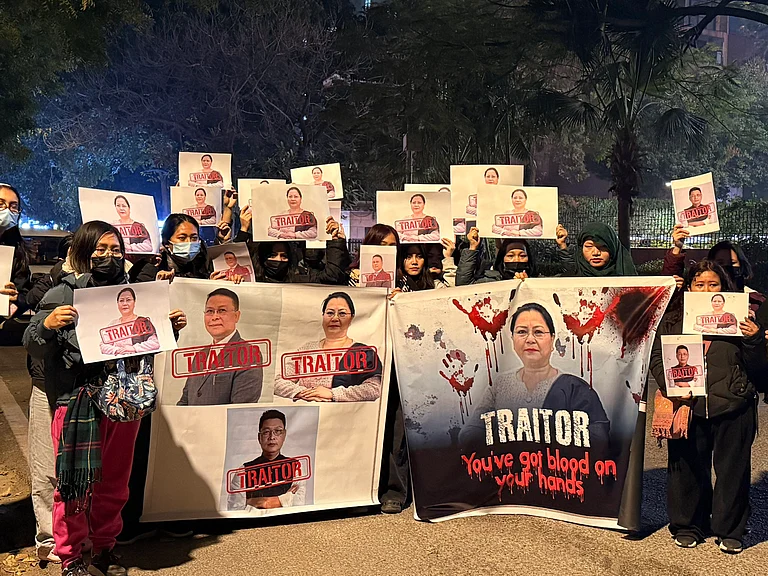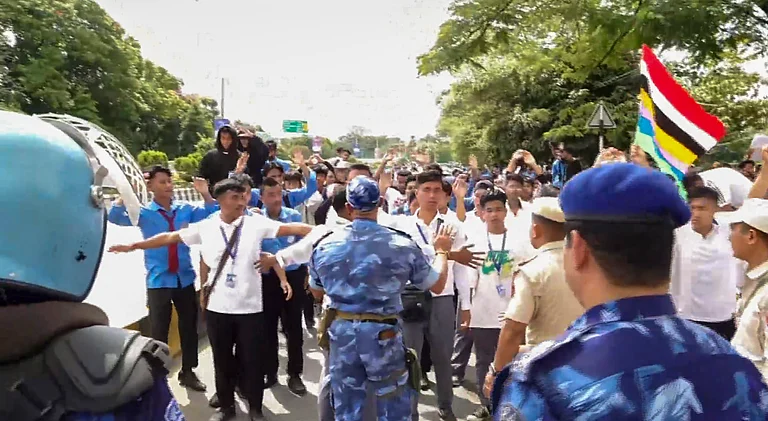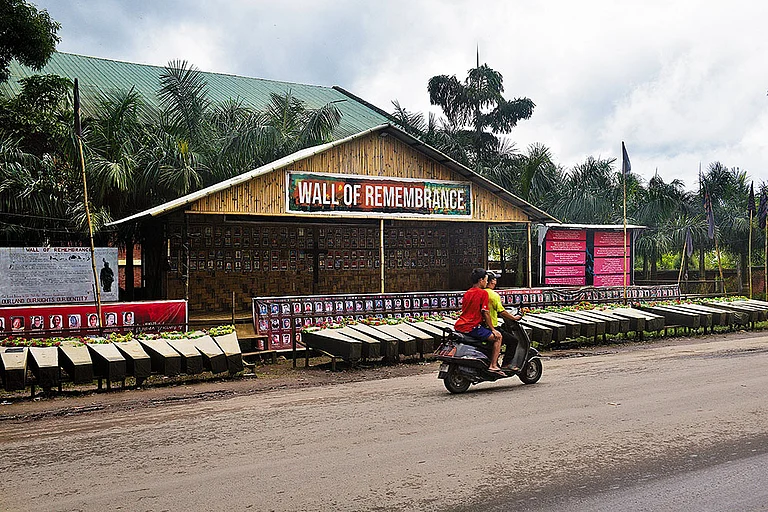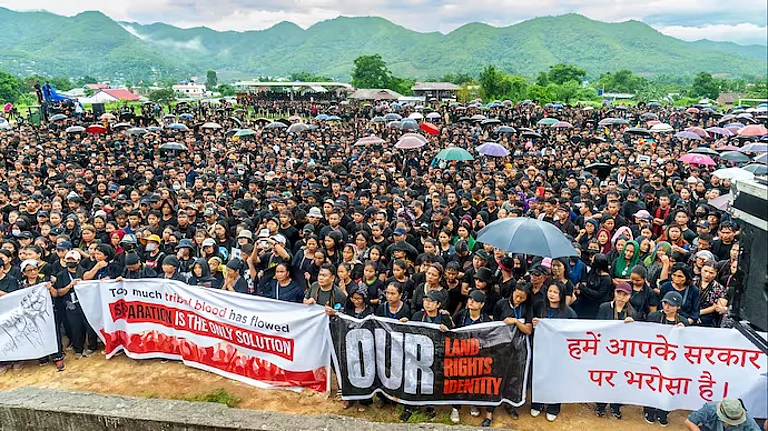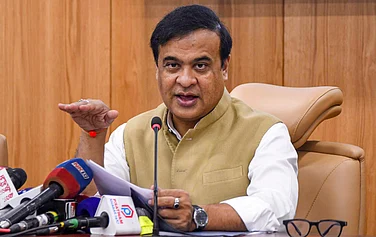33-year-old N Hmar* (name withheld) and his three children, the oldest aged eight and youngest just a few months old, are back at the Hmarkhawlien relief camp in Assam’s Barak Valley where they have spent much of the last year since ethnic violence consumed their home in Manipur. They had been displaced first in June when violence erupted in their Jiribam. Now, after a short stint at home, they are back at the camp. But unlike previous time, N's 31-year-old wife and the children's mother, Z Hmar*, is not with them.
Women and Children Killed In Cycle of Violence
Z was violently killed on November 7 in the village of Zairawn located in Manipur’s Jiribam district bordering Assam, a region that had experienced a relatively lesser degree of violence since ethnic clashes spread across Manipur in May 2023. The conflict has since claimed over 250 lives and since November 7, at least 21 lives have been lost in Jiribam itself including three women. According to the Hmar victim’s husband, Z was tortured and burned alive in the village while miscreants allegedly belonging to Arambai Tenggol burnt houses of Kukis and Hmar residents. The victim’s charred remains were found inside the house the next day amid rumours and reports of the woman allegedly being raped before being burnt alive. N Hmar does not want to comment on the allegations of rape. However, in the FIR he lodged at Jiribam police station, the husband has alleged violations, including rape and murder based on racial, communal, and gender grounds, property destruction and criminal trespass after sunset under relevant sections of the Bharatiya Nyaya Samhita. Confirming the reports on phone, N adds that the cycle of violence must stop.
The violence did not end. On November 11, in what is being dubbed as a “retaliatory attack”, alleged Hmar militants attacked the relief camp in Borobekra of Jiribam district and abducted three women along with three minors including an eight-month-old baby. Two elderly people were burnt alive in the camp. According to Manipur police, the armed assailants tried to attack the local police station, leading to a gunfight in which at least ten alleged militants were killed by armed forces. The incident left one CRPF jawan injured.
Soon after the incident, videos of the incident emerged on social media. A 12-second video depicting a man asking an armed CRPF personnel guarding the relief camp if there was “any Meitei inside?” The video shows no signs of confrontation. A report in The Hindu quoted a senior government official stating that a “Facebook page run by a Kuki-Zo group uploaded the picture of the abducted children and women on Tuesday”.
Since then, six bodies have been found. The bodies of one woman and two children from the same family--31-year-old Telem Thoibi Devi, her daughter Telem Thajmanbi Devi, and her sister-in-law’s infant son Laisram Langamba Singh--were recovered near the Assam-Manipur border on November 15. The children were aged eight years and eight months respectively. The body of another abductee identified as the 65-year-old family matriarch Y Rani Devi, and another child, her two-year-old grandson Laisram Chingkheiganba Singh, were found on November 17 in Barak river in Lakhipur. Another body of a woman, believed to be the last of the six abductees, has also been found floating in Barak river this week.
The abducted were reportedly among a group of 13 Meitei people who were displaced from their homes in June and and had been living close to the CRPF camp at Jakuradhor and Borobekra police station where the encounter took place, as per media reports.
Flames Reach Imphal
The cycles of violence has led to an eruption of anger, especially among the dominant valley-dwelling Meitei community which has been demanding accountability from the BJP-N Biren Singh government.
Amid clashes between security forces and local community members resulting in arson which has continued in Jiribam, a 22-year-old Meitei local Kh Athouba Singh was killed by gunfire of security personnel near Jiribam police station where locals and protesters had been confronting security forces. As per reports by the Indian Express, another body of a Kuki-Zo man has been recovered in Jiribam on November 16.
The flames of violence in Jiribam traveled to Imphal valley where angry mobs on November 16 attacked homes of three state ministers and six MLAs. As bodies continued to be discovered, more attacks took place. On November 17, mobs attacked the ancestral home of a BJP MLA whose other residence had already been attacked the day before. Of the 21 deaths that have taken place in the last eleven days in Jiribam, the National Investigative Agency (NIA) has taken over the probe in three cases--one pertaining to the murder of the tribal woman and two pertaining to incidents that took place in Zairawn and the other two pertaining to the incidents that took place in Borobekra.
How Violence Escalated in ‘Peaceful’ Jiribam
Jiribam, which had remained relatively untouched by the violence that began in May 2023 between the Meiteis and Kuki-Zo communities, came under attack in June this year when the homes of Kuki-Zo-Hmar peoples were attacked. The minority Hmar people are a scheduled tribe belonging to the Chin-Kuki-Mizo ethnic group living across northeastern states like Manipur, Mizoram, Meghalaya, Tripura, Assam and parts of Myanmar. In August, the Hmars and Meiteis reportedly reached an agreement for peace, prompting some like N Hmar to return to their villages in Jiribam. Despite the so-called peace treaty between the Hmars and Meiteis, villages around N's home village Zairawn (which had not been attacked untill November 7) remained tense. Kukis and Meiteis had been clashing in the nearby village of Mongbung and Sejang through September and October. These Kuki and Meitei communities were not part of any of the peace talks. Moreover, even the Hmar civil society across Manipur refused to accept the agreement. The Hmar Inpui, the community’s apex body, had eventually claimed in August itself that the peace pact was ‘null and void’ as it had been signed by its affiliated units in Jiribam without the knowledge or intimation of the general headquarters and senior leaders.
Since their return to Jiribam in October, N says that his and families of other displaced people remained indoors and were not even armed, even though village volunteers from the Kuki-Meitei communities carried arms. Since May 2023, over 4,000 police weapons have incidentally been looted across the state. Several units and headquarters of different militant groups under Suspension of Operations (SoO) spread across the hilly regions of the state have also been looted.
Mounting Cases of Violence Against Women
Horrific incidents of physical and sexual violence against women have surfaced since last year in Manipur. In the recent flare up, three of the women killed - one tribal and two Meietei - were all working class mothers. In a recent interview with Outlook, Ima Ngambi, President of All Manipur Kanba Ima Lup (AMKIL), an organisation of Meira Paibis (Meitei mothers and women rights activists), condemned the attacks on women taking place on both sides.
“Women’s bodies are being used as weapons of war. This is the case in every war or conflict. Women, who have nothing to do with war and are physically weaker are the first to be targeted in conflict between men and they pay with their bodies and lives,” she said.
Ngambi was one of the twelve mothers of Manipur who had famously protested against the brutal custodial rape and murder of the a Meitei girl, Thangjam Manorama, by members of the Assam Rifles almost 25 years ago at the peak of the AFSPA era in Manipur. “Then too, women paid with their bodies, now also the same is happening,” she stated. The elderly activist also augured that lax implementation of gender safety laws, long drawn out court cases and rare convictions of perpetrators of gender-based violence amount to the perpetuation of a culture of violence against women.
Last year, cases of brutal violence against women emerged out of Manipur, including multiple cases of sexual violence. The discoveries piled on after the controversial video of two tribal women being paraded naked by a mob while being attacked was leaked online. The viral video helped shed light on other cases of sexual violence involving not just women but minors as well.
On June 4, seven-year-old Tongsing Hangsing and his mother Meena Hansingh were burnt alive in a car along with a Meitei woman, Lydia Lourembam, in Kangpokpi. Hansingh’s displaced husband who lives in Kangpokpi in a rented flat now claims that no development has taken place in the case, which was taken over by the CBI in August 2023 after intervention of the Supreme Court. Except one, all seventeen cases of sexual violence that took place amid the conflict that were handed over to the CBI by the top court remain pending trial.







